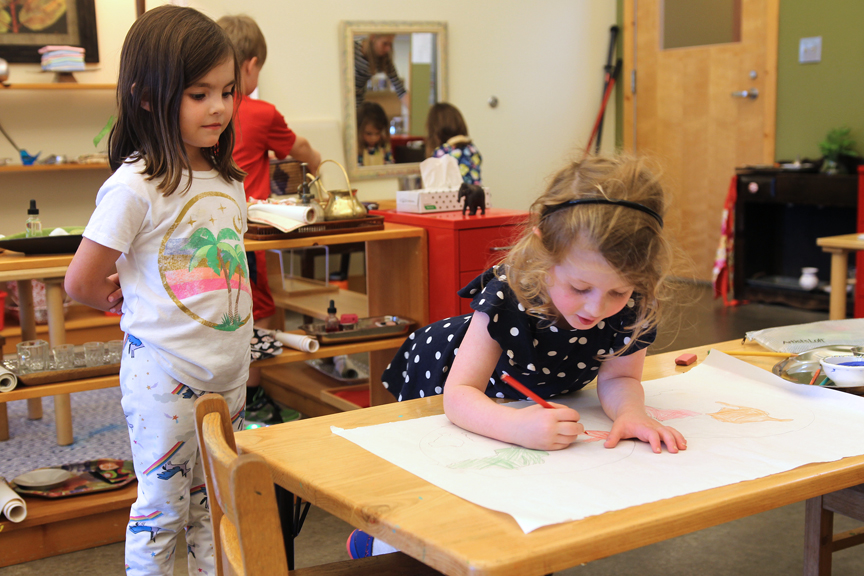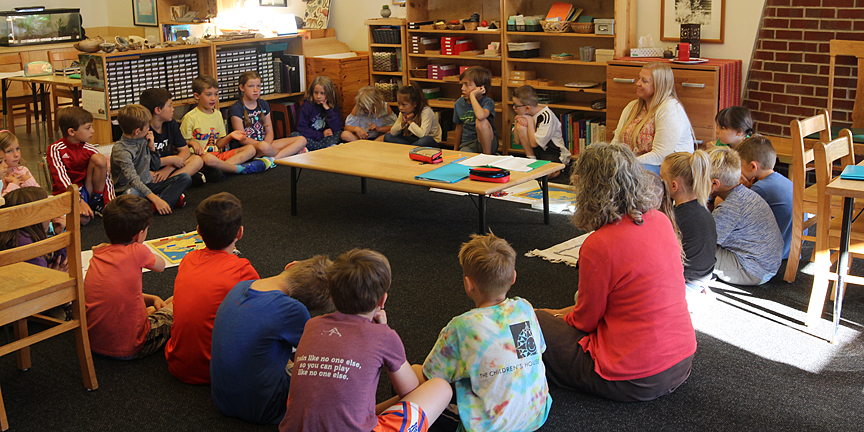The first days of a new school year usher the children in with the promise of extraordinary potential. As they settle back into the routine of classroom life with one another, the guides take great care to establish a positive tone, respect, and care.
Grace and courtesy lessons are one of the most fundamental aspects of a Montessori classroom. These lessons provide clear and tangible guidelines for how to care for one another, the classroom and themselves. As we reestablish routines, these lessons are offered frequently to the children to establish expectations for behavior.
In the Young Children’s Community (YCC), a lesson may simply be quietly helping a child learn how to carefully walk through the environment. The guide may simply say “I am showing you how to carefully walk in our classroom.”
 In a Primary classroom, these lessons become a bit more formalized. The guide gathers a small group of children to sit on the floor. She would say to the group “I am going to show you how to observe someone’s work.” She would then demonstrate how to ask a working child if she may observe, and then stand quietly with her hands at her sides as she observes. She then would offer a child or two the opportunity to demonstrate the skill, and end the lesson by saying “Now you know how to observe someone’s work.”
In a Primary classroom, these lessons become a bit more formalized. The guide gathers a small group of children to sit on the floor. She would say to the group “I am going to show you how to observe someone’s work.” She would then demonstrate how to ask a working child if she may observe, and then stand quietly with her hands at her sides as she observes. She then would offer a child or two the opportunity to demonstrate the skill, and end the lesson by saying “Now you know how to observe someone’s work.”
Lessons in grace and courtesy are offered to children to provide opportunities to practice the skills needed to coexist with others. It can be as simple as how to walk around someone’s work, or as complicated as what you could say to someone who was feeling sad or left out. I once offered a grace and courtesy lesson on what to say to someone if their nose was running. It was so fun to see that lesson carried out in the life of our classroom. Children were offering one another tissues every day!
Sometimes, adults expect children to know how to be graceful and courteous and when they aren’t, they correct the behavior in the moment. In our classrooms, we make note when we observe a child who may need a lesson and, at a time later, invite them to join a lesson that teaches that skill. In this way, a child doesn’t feel corrected or ashamed for simply not knowing the appropriate action in a situation.
 Once children are in Elementary and Junior High, conversations occur as a group to create mutual expectations of one another. Rather than having rules imposed from the teacher, children discuss how they want to coexist in their classroom and create a class creed through their conversations.
Once children are in Elementary and Junior High, conversations occur as a group to create mutual expectations of one another. Rather than having rules imposed from the teacher, children discuss how they want to coexist in their classroom and create a class creed through their conversations.
When we grow graceful, courteous children, we offer the promise of a society where humans can peacefully coexist with compassion, empathy, and peace. I love the thought that Montessori schools all over the world are providing these opportunities for children every day— to learn the skills to care for themselves, one another, and their world.